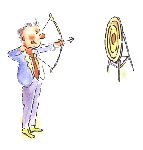 Purposes:
Purposes:
1. To introduce the relationship between stress and performance
2. To discuss stress intervention -- interpersonal
3. To introduce time management
4. To teach relaxation technique -- progressive relaxation technique (revision)
Content
The Relationship between Stress and Performance
According to the inverted U theory, an individual will have an optimal performance under optimal level of arousal. The greater the arousal, the greater the deterioration of the performance. Teacher can use daily examples such as, examinations, sports competitions, and making a public speech to explain this relationship.
Stress Intervention -- Interpersonal
It is important for us to express ourselves and have the courage to say no when we should, yes when we want to. Discuss with the students the basic human rights and the traditional incorrect assumptions. Communication skills will help people get along better with family, friends and co-workers with the result of being less stressful. To improve communication skills, we need to pay attention to both nonverbal and verbal communication. We can easily resolve conflicts if we take time to listen to others, demonstrate an understanding of the person with whom we are in conflict, and try to work out alternative solutions. Social support is a sense of belonging, being accepted, being loved or being needed. Social support usually can be provided by family members, friends, and lovers. Social support usually can protect an individual from the negative consequences of stress. It is important to be positive and change the negative self-talks to the positive one. In addition, if we have negative thoughts, we need to use thought stopping technique to reorganize our thinking. If we can manage our time well, it can eliminate putting ourselves in stressful situations. The following is some time management skills: |
| (1) Assessing how you spend your time -- |
find
out how you spend your time and identify the time wasters, e.g.
telephone calls, socializing meetings, indecision, lack of planning,
worrying, watching television.
|
| (2) Setting goals -- | set the long term and short term goals, so that you have a clear sense of where to go. This will maximize the chance of achieving the goals. |
| (3) Prioritizing -- | you can develop the ABC lists to prioritize the activities. |
| A -- must be done | |
| B -- like to do and need to be done | |
| C -- like to do if you complete the tasks on A and B lists | |
| (4) Scheduling - | after you prioritize the activities, you can then schedule them into the daily and weekly timetable. |
| (5) Saying "NO" - | in order to prevent work overload, do not feel guilty to say "no" if necessary. |
| (6) Delegating - |
do not
hesitate to seek help when you are short on time and overloaded,
you may get others to do those things that do not need your personal
attention but need to be done.
|
| (7) Limiting interruptions - | try to minimize interruptions such as telephone calls, visitors. Stick to your schedule as much as you can. |
Relaxation Technique --
Progressive Relaxation Technique(revision)
Class Activities
|
1. Teacher explains the relationship between stress and performance 2. Teacher introduces interpersonal stress intervention 3. Teacher introduces time management 4. Practise progressive relaxation technique |
Teaching Materials
-
Literature: Stress and Performance
- Literature: Stress
Intervention - Interpersonal
-
Please click here to download Stress Management text. (MS Word).